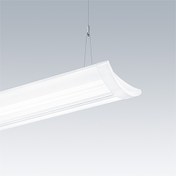IQ Wave SP / IQ SUSP S LED4900-840 BC E3 ML4 WH
92906330
▼ Data Sheet
A lightweight, Suspended, LED luminaire with MV Tech optic. Electronic, dimmable control gear, Wireless connection via app with Bluetooth® 4.x - basicDIM Wireless with 3 hour, manual test, emergency lighting circuit. Class I electrical, IP20, IK05. Body, diffuser, frame and endcaps: polycarbonate finished in white (close to RAL9016). Gear tray: pre-coated white steel. Fitted with 4 core cable of 2,5m length. Complete with 3000K LED
Radio definition: basicDIM Wireless - Bluetooth® 4.x, Radio frequency: 2.4...2.483 GHz, Radio power: +4 dBm.
Dimensions: 1140 x 210 x 70 mm
Luminaire input power: 42 W
Luminaire luminous flux: 4900 lm
Luminaire efficacy: 117 lm/W
weight: 5.1 kg
- LED
- CE
- GLedReP
- 650°
- IK05
- IP20
- LLedNr
- RCM
- Electrical class I
- Ta = 0 to +25

